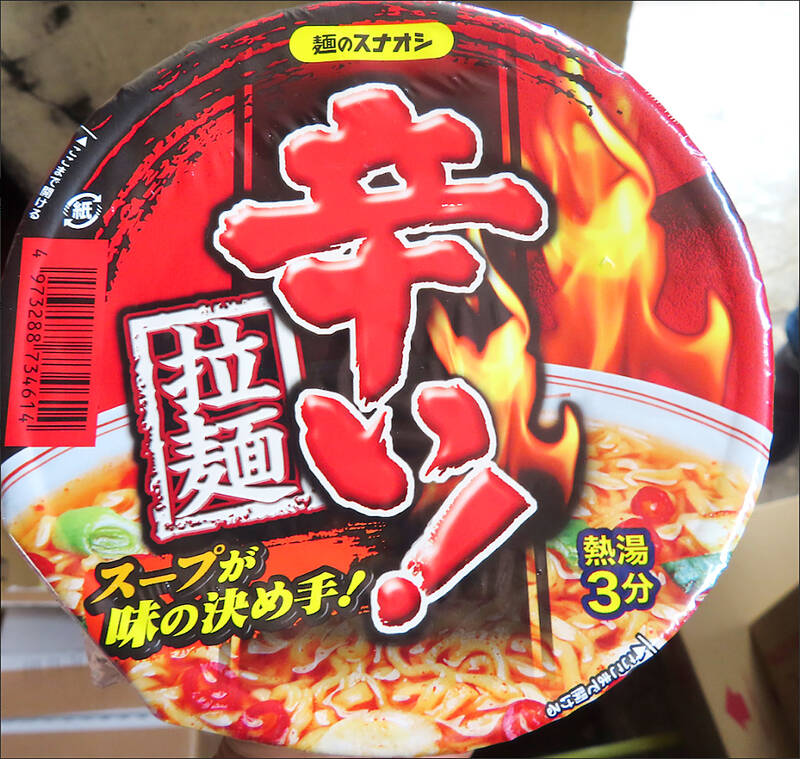A shipment of instant noodles from Vietnam and another from Japan were seized at the border after they were found to contain residue of a banned pesticide, the Food and Drug Administration (FDA) said in a statement on Tuesday.
A 1,458kg shipment of Acecook Hao Hao sour shrimp flavor instant noodles imported from Vietnam by Taiwan’s Qian Yu Food Enterprise Co was confiscated after 0.382mg/kg of ethylene oxide was detected in the product’s vegetable seasoning sachets, the FDA said.
In addition, a 37.92kg shipment of Sunaoshi cup instant ramen from Japan, imported by Taiwan’s Excel Right Trading Co, was also confiscated and destroyed after 0.209mg/kg of ethylene oxide was detected, it said.

Photo courtesy of the Food and Drug Administration
Ethylene oxide, a widely used industrial product, is banned in foods in Taiwan as it is classified as a first-class carcinogen.
Long-term exposure can increase the risk of cancer, and cause central nervous or peripheral neuropathy, according to the FDA.
The shipments were among 13 imported food and food container items that failed recent safety tests at the border, the agency said in its weekly report on substandard food imports.
Such items are either returned to the country of origin or destroyed, it said.
Over the past six months, six shipments of instant noodles with meat imported from Vietnam failed customs inspection, FDA data showed.
Since Aug. 29, the FDA has stepped up inspections of imported instant noodles with meat from Vietnam and have conducted batch-by-batch checks of shipments brought in by Qian Yu because its imports have failed inspections three times in six months, FDA Northern Center head Chen Ching-yu (陳慶裕) said.
With five shipments of instant noodles imported from Japan also failing inspections over the past six months, the FDA starting from Aug. 8 increased the percentage of such imports checked from 2 to 10 percent to about 20 to 50 percent, Chen said.

Three batches of banana sauce imported from the Philippines were intercepted at the border after they were found to contain the banned industrial dye Orange G, the Food and Drug Administration (FDA) said yesterday. From today through Sept. 2 next year, all seasoning sauces from the Philippines are to be subject to the FDA’s strictest border inspection, meaning 100 percent testing for illegal dyes before entry is allowed, it said in a statement. Orange G is an industrial coloring agent that is not permitted for food use in Taiwan or internationally, said Cheng Wei-chih (鄭維智), head of the FDA’s Northern Center for

LOOKING NORTH: The base would enhance the military’s awareness of activities in the Bashi Channel, which China Coast Guard ships have been frequenting, an expert said The Philippine Navy on Thursday last week inaugurated a forward operating base in the country’s northern most province of Batanes, which at 185km from Taiwan would be strategically important in a military conflict in the Taiwan Strait. The Philippine Daily Inquirer quoted Northern Luzon Command Commander Lieutenant General Fernyl Buca as saying that the base in Mahatao would bolster the country’s northern defenses and response capabilities. The base is also a response to the “irregular presence this month of armed” of China Coast Guard vessels frequenting the Bashi Channel in the Luzon Strait just south of Taiwan, the paper reported, citing a

A total lunar eclipse, an astronomical event often referred to as a “blood moon,” would be visible to sky watchers in Taiwan starting just before midnight on Sunday night, the Taipei Astronomical Museum said. The phenomenon is also called “blood moon” due to the reddish-orange hue it takes on as the Earth passes directly between the sun and the moon, completely blocking direct sunlight from reaching the lunar surface. The only light is refracted by the Earth’s atmosphere, and its red wavelengths are bent toward the moon, illuminating it in a dramatic crimson light. Describing the event as the most important astronomical phenomenon

UNDER PRESSURE: The report cited numerous events that have happened this year to show increased coercion from China, such as military drills and legal threats The Chinese Communist Party (CCP) aims to reinforce its “one China” principle and the idea that Taiwan belongs to the People’s Republic of China by hosting celebratory events this year for the 80th anniversary of the end of World War II, the “retrocession” of Taiwan and the establishment of the UN, the Mainland Affairs Council (MAC) said in its latest report to the Legislative Yuan. Taking advantage of the significant anniversaries, Chinese officials are attempting to assert China’s sovereignty over Taiwan through interviews with international news media and cross-strait exchange events, the report said. Beijing intends to reinforce its “one China” principle